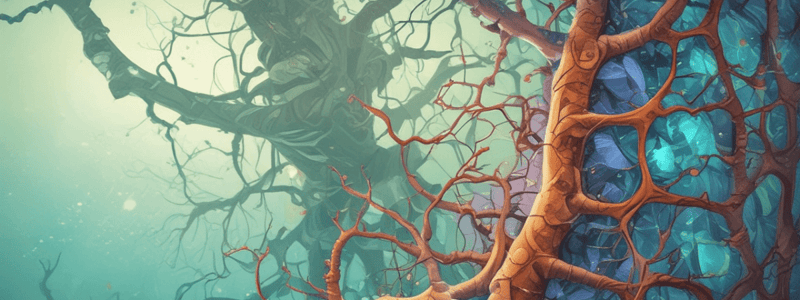Podcast
Questions and Answers
What is the study of interactions between organisms and their environment?
What is the study of interactions between organisms and their environment?
- Botany
- Ecology (correct)
- Microbiology
- Genetics
What is the main function of mitochondria in a cell?
What is the main function of mitochondria in a cell?
- Energy production (correct)
- Cell signaling
- Protein synthesis
- Cell division
What is the process by which DNA is copied into RNA?
What is the process by which DNA is copied into RNA?
- Gene flow
- Transcription (correct)
- Mutation
- Translation
What is the term for the process by which one amino acid is encoded by three nucleotides?
What is the term for the process by which one amino acid is encoded by three nucleotides?
What is the term for the movement of genes from one population to another?
What is the term for the movement of genes from one population to another?
What is the term for the study of the structure, function, and evolution of the universe's ecosystems?
What is the term for the study of the structure, function, and evolution of the universe's ecosystems?
What is the main function of the circulatory system?
What is the main function of the circulatory system?
What is the term for the process by which water moves through a plant, from the roots to the leaves, and is then released into the air as water vapor?
What is the term for the process by which water moves through a plant, from the roots to the leaves, and is then released into the air as water vapor?
Flashcards are hidden until you start studying
Study Notes
Branches of Biology
- Botany: study of plants
- Zoology: study of animals
- Microbiology: study of microorganisms
- Ecology: study of interactions between organisms and their environment
- Genetics: study of heredity and variation
- Biochemistry: study of chemical processes in living organisms
- Molecular Biology: study of biological molecules and their interactions
- Evolutionary Biology: study of evolution and its processes
Cell Biology
- Cell structure:
- Plasma membrane
- Cytoplasm
- Nucleus
- Mitochondria
- Endoplasmic reticulum
- Ribosomes
- Cell functions:
- Metabolism
- Energy production
- Protein synthesis
- Cell division
- Cell signaling
Molecular Biology
- DNA structure:
- Double helix
- Nucleotides (A, C, G, T)
- RNA structure:
- Single strand
- Nucleotides (A, C, G, U)
- Gene expression:
- Transcription (DNA to RNA)
- Translation (RNA to protein)
- Genetic code:
- 3 nucleotides encode 1 amino acid
- 20 amino acids are used in proteins
Evolution
- Mechanisms of evolution:
- Natural selection
- Genetic drift
- Mutation
- Gene flow
- Types of evolution:
- Microevolution (within a population)
- Macroevolution (between populations)
- Evidence for evolution:
- Fossil record
- Comparative anatomy
- Molecular biology
Ecosystems
- Components of ecosystems:
- Biotic factors (living organisms)
- Abiotic factors (non-living environment)
- Energy flow:
- Producers (plants)
- Consumers (herbivores, carnivores, omnivores)
- Decomposers (bacteria, fungi)
- Nutrient cycles:
- Carbon cycle
- Nitrogen cycle
- Water cycle
Biological Systems
- Nervous system:
- Central nervous system (brain, spinal cord)
- Peripheral nervous system (nerves)
- Circulatory system:
- Heart
- Blood vessels
- Blood
- Immune system:
- White blood cells
- Lymphatic system
- Immune responses
Branches of Biology
- Botany is the study of plants
- Zoology is the study of animals
- Microbiology is the study of microorganisms
- Ecology is the study of interactions between organisms and their environment
- Genetics is the study of heredity and variation
- Biochemistry is the study of chemical processes in living organisms
- Molecular Biology is the study of biological molecules and their interactions
- Evolutionary Biology is the study of evolution and its processes
Cell Biology
- A cell's structure consists of a plasma membrane, cytoplasm, nucleus, mitochondria, endoplasmic reticulum, and ribosomes
- Cell functions include metabolism, energy production, protein synthesis, cell division, and cell signaling
Molecular Biology
- DNA has a double helix structure composed of nucleotides A, C, G, and T
- RNA has a single strand structure composed of nucleotides A, C, G, and U
- Gene expression involves transcription (DNA to RNA) and translation (RNA to protein)
- The genetic code uses 3 nucleotides to encode 1 amino acid, with 20 amino acids used in proteins
Evolution
- Mechanisms of evolution include natural selection, genetic drift, mutation, and gene flow
- Evolution can be microevolution (within a population) or macroevolution (between populations)
- Evidence for evolution includes the fossil record, comparative anatomy, and molecular biology
Ecosystems
- Ecosystems consist of biotic factors (living organisms) and abiotic factors (non-living environment)
- Energy flows through producers (plants), consumers (herbivores, carnivores, omnivores), and decomposers (bacteria, fungi)
- Nutrient cycles include the carbon cycle, nitrogen cycle, and water cycle
Biological Systems
- The nervous system includes the central nervous system (brain, spinal cord) and peripheral nervous system (nerves)
- The circulatory system consists of the heart, blood vessels, and blood
- The immune system includes white blood cells, the lymphatic system, and immune responses
Studying That Suits You
Use AI to generate personalized quizzes and flashcards to suit your learning preferences.




